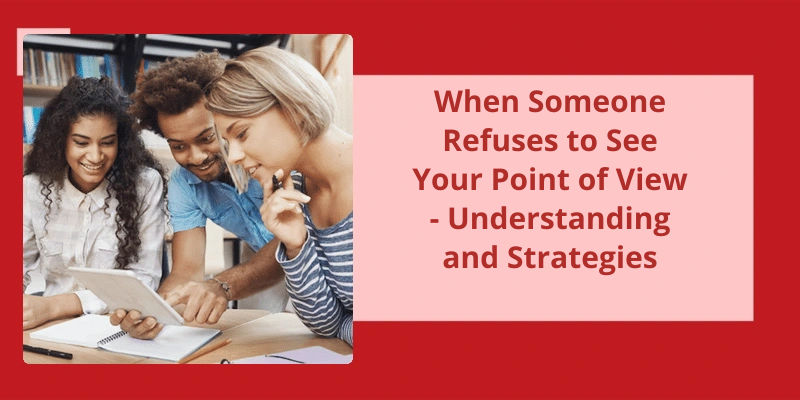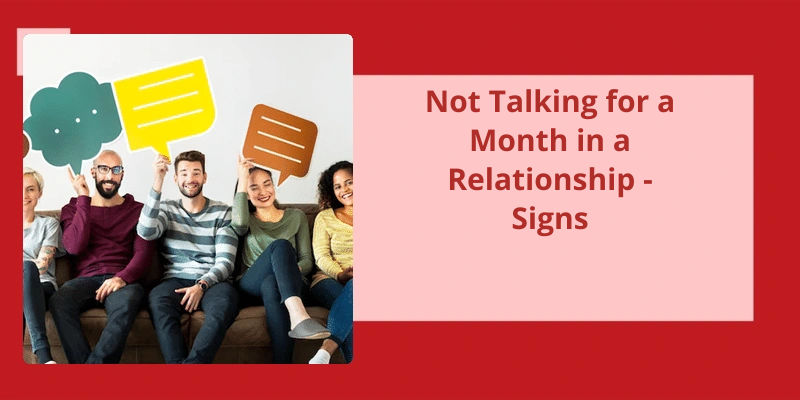It can be frustrating when you're trying to have a conversation with someone and they simply refuse to see your point of view. It can feel like you're hitting a brick wall and no matter how much you explain your perspective, they just can't seem to understand. However, this resistance to alternative viewpoints may not be a result of stubbornness or closed-mindedness, but rather egocentric tendencies. When someone is egocentric, they tend to view the world from their own narrow perspective, often lacking empathy or the ability to consider alternative solutions that don't center around themselves. If you suspect that you may have egocentric tendencies and struggle to see things from another person's point of view, working with a therapist may be the first step towards understanding and overcoming this behavior.
How Does Your View of a Situation Change When You Look at It From Another Person’s Perspective?
Have you ever had a disagreement with someone and felt like they just don’t understand your point of view? It’s easy to get caught up in our own perspective and forget that others may see things differently. When we take the time to look at a situation from someone elses perspective, our understanding of that situation can change drastically. Suddenly, what once seemed clear-cut and simple is now much more complex.
Looking at a situation from someone elses perspective can help us to see the nuances and complexities that we may have missed before. It can also help us to empathize with that person and understand their motivations for acting the way they do. When we take on someone elses perspective, we start to see more of that person in ourselves. This can increase our social bonds and reduce stereotypes, as we come to understand that everyone has their own unique experiences and perspectives.
In addition to increasing our empathy and understanding of others, taking on someone elses perspective can also be a valuable tool for problem-solving. By considering multiple perspectives, we’re better equipped to find creative and effective solutions to complex problems. It can also help us to avoid misunderstandings and miscommunications, as we’re more likely to approach situations with an open mind and a willingness to see things from multiple angles.
Of course, taking on someone elses perspective can be challenging. It requires us to step outside of our own experiences and biases and really try to see things from another persons point of view. It can be uncomfortable, but it’s often necessary in order to truly understand and connect with others. When we’re able to do this, we can build stronger relationships and create a more empathetic and understanding society.
The Impact of Social Media and Echo Chambers on Our Ability to See Others’ Perspectives
- Social media provides a platform to connect with like-minded individuals
- However, this can create echo chambers where we only hear opinions that are similar to our own
- This can lead to a lack of exposure to diverse perspectives
- It can also reinforce existing biases and make it harder to empathize with those who hold different views
- It’s important to actively seek out diverse perspectives and engage in respectful dialogue with those who hold different views
By taking the time to consider the perspectives of others, we can open ourselves up to greater insight and understanding of the world around us. This can help us become more empathetic and reduce conflicts while also reducing any biases or judgments that we may have. In the following paragraphs, we’ll explore some ways that considering others’ perspectives can benefit us in our personal and professional lives.
Why Is It Important to Consider the Perspective of Others?
When we consider the perspective of others, we develop a more nuanced understanding of complex situations. We become more open-minded and begin to see things from different angles. This, in turn, helps us to make more informed decisions and allows us to empathize with the experiences of others. If we rely solely on our own perspective, we may miss out on important information and end up making decisions that aren’t well-informed or fair.
When we take the time to understand the experiences and perspectives of others, we’re better able to identify our own biases and reduce them. We’re less likely to judge people based solely on surface-level characteristics, such as race, gender, or socio-economic status. We can recognize the unique challenges that individuals face based on their experiences and understand that there’s often no “one-size-fits-all” solution to complex problems.
Moreover, understanding the perspectives of others helps us to communicate more effectively. When we’re able to see things from another persons point of view, we can tailor our language and approach to better resonate with them. We can engage with people in a way that’s respectful and meaningful, and this can help to build stronger relationships both personally and professionally.
Considering the perspective of others also helps us to resolve conflict. When we’re able to understand where another person is coming from, we can more effectively address their concerns and find a way to work towards a resolution that’s mutually beneficial. This requires a level of empathy and active listening that’s often undervalued, but it can truly make a huge difference in our ability to navigate challenging situations and resolve conflicts peacefully.
Finally, it’s important to consider the perspective of others because it allows us to be more compassionate and understanding. When we can empathize with others, we see them as complex individuals rather than as a stereotype or caricature. We can recognize their talents, strengths, and unique characteristics, and we’re better able to appreciate and celebrate diversity in all of it’s forms. This, in turn, contributes to a more inclusive and supportive community where everyone feels valued and respected.
It isn’t just about being perceived as considerate, though. Failing to consider the perspectives of others can have much deeper consequences, both in our personal relationships and in society as a whole.
What Are the Consequences of Not Considering the Perspectives of Others?
Disregarding the perspectives of others can lead to misunderstandings and miscommunications in both personal and professional settings. When we assume that our perspective is the only valid one, we close ourselves off to the possibility of understanding how others think and feel. This can create a lack of empathy and make it difficult to forge strong relationships with others. In the workplace, failing to consider the perspectives of colleagues can lead to conflict, mistrust, and decreased productivity.
Ignoring the perspectives of others can also perpetuate systemic inequalities and reinforce discriminatory attitudes. This can be particularly harmful to marginalized groups who’re often excluded from mainstream discussions and decision-making processes. Without considering the experiences and perspectives of these groups, we risk perpetuating harmful stereotypes and biases, and furthering their marginalization. This can have lasting social and economic consequences for individuals and communities.
In relationships, failing to consider the perspectives of our partners, friends, and family members can lead to hurt feelings and damaged trust. When we prioritize our own needs and desires over those of others, we create an imbalance that can strain even the strongest relationships. By actively listening to and considering the perspectives of others, we can show them that we value their thoughts and feelings, and foster deeper, more meaningful connections.
Perhaps most importantly, failing to consider the perspectives of others can limit our own personal growth and development. When we only see the world through our own perspective, we miss out on opportunities to learn from others and broaden our own understanding. By seeking out diverse perspectives, we can challenge our own assumptions, expand our knowledge, and develop a deeper appreciation for the complexities of the world around us.
The Benefits of Considering the Perspectives of Others
- Increased empathy and understanding
- Enhanced problem-solving abilities
- Improved teamwork and collaboration
- Strengthened relationships and communication
- Reduced conflict and misunderstandings
- Increased creativity and innovation
- Greater personal growth and self-awareness
- Greater respect for diversity and inclusivity
- Expanded knowledge and perspective
- Enhanced decision-making abilities
Source: Perspective Taking – Socially Skilled Kids
Understanding why people only see things from their own perspective can be a complex issue. However, one key factor is the egocentric bias, where individuals rely too heavily on their own viewpoint and may have a higher opinion of themselves than they should. This bias can make it challenging to see things from a different perspective and can impact one’s memory consolidation. In this article, we’ll explore the egocentric bias in more detail and how it affects our interactions with others.
Why Do People Only See Things From Their Perspective?
It’s a natural tendency for humans to view the world through their own lens. Our experiences, beliefs, and emotions all influence the way we perceive the world around us. This can lead to confirmation bias, where we seek out information that confirms our beliefs and ignore information that contradicts it. It can also lead to negative biases, where we judge others based on their outward appearance or group affiliation. These biases can be especially harmful when they influence our decision-making in areas such as hiring, promotions, and healthcare.
Another reason why people may see things only from their perspective is the fear of the unknown. When we encounter something new, our brain can go into a “fight or flight” response, causing us to view the situation in a negative light. This can prevent us from seeing the full picture or considering alternative viewpoints. It can also lead to stereotyping and prejudice, where we categorize people based on their race, gender, or religion, and assume they all have the same characteristics.
Socialization also plays a role in our limited perspective. We’re raised in a certain culture with specific values, customs, and beliefs. These can shape our worldview and influence the way we interpret events and interactions. It can also lead to groupthink, where we conform to the opinions of the group and ignore dissenting viewpoints. This can be dangerous in situations such as politics or business, where critical thinking is necessary for success.
It’s also important to acknowledge that our perspective can be limited by our mental health or cognitive abilities. Depression, anxiety, and other mental health disorders can cloud our judgment and prevent us from seeing the full picture. Similarly, cognitive biases such as the anchoring effect or availability heuristic can cause us to make faulty judgments based on incomplete or irrelevant information.
Overall, the egocentric bias and limited perspective are complex phenomena influenced by a variety of factors. It’s important to be aware of these biases and actively work to expand our worldview and consider alternative viewpoints. This can lead to more empathy, understanding, and ultimately, a more inclusive and just society.
Conclusion
In conclusion, when faced with someone who refuses to see our point of view, it can be disheartening and frustrating. However, it's important to recognize that their refusal may stem from egocentric tendencies. These tendencies can manifest in a lack of empathy and a propensity to suggest self-centered solutions. If you suspect that you struggle with egocentrism, seeking support from a therapist can be very beneficial. Ultimately, it's important to be patient, kind, and understanding, even in the face of disagreement or opposition. With time and effort, it may be possible to help others see different perspectives and work towards mutual understanding.






